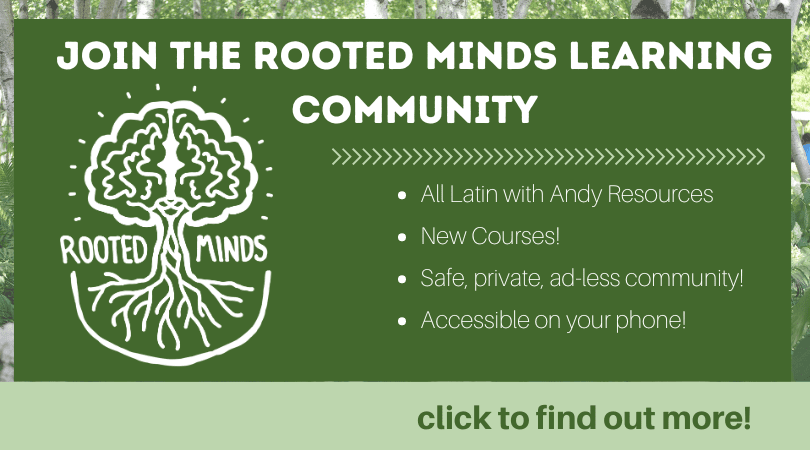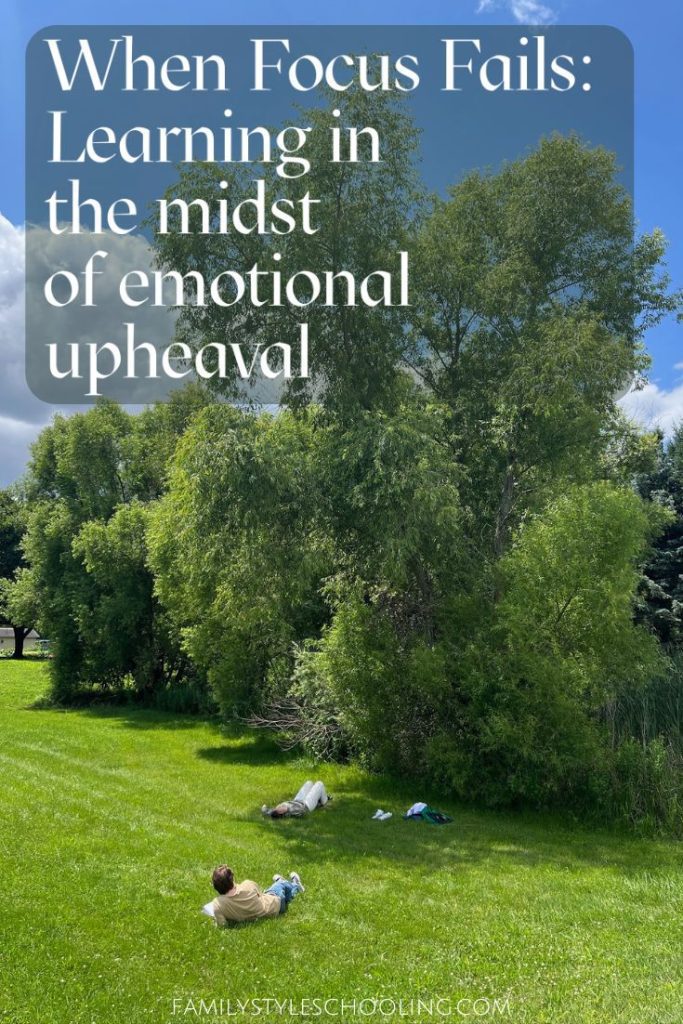When Focus Fails: Learning in Emotional Upheaval
When we talk about learning, we often focus on curriculum, schedules, and academic goals. But what happens when life throws emotional curveballs that make traditional focus impossible?
The Reality of Emotional Upheaval
Life doesn't pause for learning. Whether it's family crisis, personal struggles, or unexpected challenges, emotions can seemingly derail our carefully laid educational plans.
Homeschool is unique in the fact that you're at home and the problems and challenges that surface are directly connected to the school work you're attempting to accomplish. When a sibling conflict erupts during math time, or grief over a lost pet impacts reading comprehension, these aren't distractions from learning—they're integral parts of the educational journey. This intimate connection between home life and academics creates both challenges and extraordinary opportunities for deeper learning and emotional growth.
The Hidden Curriculum at Work
What we do in moments of emotional intensity teaches far more than any planned lesson. This "hidden curriculum" shapes:
- How we handle stress and uncertainty
- Our approach to problem-solving under pressure
- The way we view failure and resilience
- Our understanding of self-care and boundaries
Our kids are watching how we handle trouble. In the midst of emotional upheaval, they're learning not just from what we say, but from how we navigate the stormy waters. When we acknowledge our feelings while maintaining a commitment to growth and learning, we teach them that education isn't just about perfect conditions—it's about perseverance through all seasons. They see that it's okay to struggle, to pause, to adapt, and to keep moving forward, even if the path looks different than we initially planned.
Learning Through Emotional Upheaval
During emotional upheaval, learning doesn't stop - it transforms. Consider these key aspects:
1. The Power of Presence
Consistently showing up to learn and engage, even when we feel inadequate or unprepared, becomes a powerful demonstration of persistence that our children internalize. This imperfect presence teaches them that authenticity matters more than perfection, and that showing up faithfully, despite our limitations, builds character and creates meaningful learning opportunities. When we acknowledge our struggles while continuing to participate in the learning process, we model a genuine approach to education that values growth over perfection.
2. Emotional Intelligence Development
When students engage with academic content, they naturally develop skills to recognize, understand, and work through their feelings. This dual process allows children to build emotional awareness alongside traditional learning, creating deeper neural connections and more meaningful educational experiences. When we acknowledge and process emotions as part of the learning journey, students develop valuable life skills that enhance their ability to engage with challenging material and navigate complex situations. This dual process allows children to build emotional awareness alongside traditional learning, creating deeper neural connections and more meaningful educational experiences. When we acknowledge and process emotions as part of the learning journey, students develop valuable life skills that enhance their ability to engage with challenging material and navigate complex situations.
3. Adaptive Learning Strategies
We create flexible approaches that honor both educational goals and emotional needs, recognizing that learning can happen in different ways and at different paces during challenging times. This involves developing adaptable strategies that maintain academic progress while providing space for emotional processing, allowing students to engage with the material in ways that respect their current emotional capacity while still moving forward in their educational journey.

The Teacher's Role in Emotional Seasons
Teachers and parents demonstrate crucial life skills through:
- Modeling healthy emotional processing
- Adjusting expectations while maintaining standards
- Creating safe spaces for both learning and feeling
In my own journey of homeschooling through grief, I've experienced firsthand how the sudden loss of loved ones can completely reshape our daily rhythms. When my sister passed away unexpectedly, our carefully planned lessons gave way to deeper conversations about life, death, and family legacy. Math worksheets were set aside for processing emotions together, reading assignments transformed into sharing cherished memories, and science experiments paused while we learned to navigate this new emotional landscape. These seasons taught me that sometimes the most profound learning happens in the quiet moments of shared grief, where academic goals shift to make space for healing, remembering, and finding new ways to move forward together.
Questions for Homeschool Parent Self-Reflection:
- Am I giving myself permission to feel and process my own emotions while teaching my children?
- How do I recognize when I'm becoming emotionally overwhelmed during our homeschool day?
- In what ways am I balancing being both mom and teacher during emotional moments?
- Which friends or homeschool groups can I lean on for support and understanding?
- When was the last time I evaluated my emotional capacity to teach effectively?
- What boundaries do I need to set within our home to protect both teaching time and personal space?
- How do my emotional struggles affect my children's learning environment?
- What self-care practices help me stay grounded while managing both home and school?
Remember: Taking care of your own emotional health isn't selfish—it's essential for creating a stable, nurturing learning environment. Your well-being directly impacts your ability to support your students through their emotional challenges.
Building Resilience Through Integration
The intersection of emotional processing and academic learning creates unique opportunities for:
- Developing coping strategies
- Understanding personal learning patterns
- Growing in self-awareness
The development of emotional intelligence during homeschooling becomes a lifelong asset, equipping children with skills that are just as crucial as traditional academic competencies. When children learn to navigate their emotions effectively, understand others' perspectives, and develop healthy coping mechanisms, they're building a foundation for success in relationships, careers, and personal growth. This emotional literacy becomes particularly valuable in our increasingly interconnected world, where the ability to collaborate, empathize, and adapt often determines success more than pure academic achievement. Just as we wouldn't consider sending a child into adulthood without reading skills, we shouldn't underestimate the importance of emotional intelligence as a core life competency.
Practical Applications
Specific ways to work with rather than against emotional upheaval:
- Incorporating emotional check-ins into learning routines
- Using journaling or art to process while learning
- Creating flexible scheduling that responds to emotional needs
In the rhythms of learning and emotional processing, we find echoes of God's redemptive work in creation. Just as He brings order from chaos and beauty from ashes, our emotional challenges can become sacred spaces where imagination and rest serve as vehicles for spiritual renewal. When we create margin for emotional check-ins, artistic expression, and flexible scheduling, we're participating in the divine pattern of regeneration. These practices remind us that our journey of sanctification often unfolds not through rigid structure, but through seasons of rest and creative reflection that allow the Holy Spirit to restore and transform our hearts and minds.
Conclusion: The Real Lesson
Sometimes the most valuable learning happens not through our planned curriculum, but through how we handle the unexpected emotional challenges that arise along the way.
At its core, heart work is the foundation of authentic learning and growth. When we prioritize emotional and spiritual development alongside academic pursuits, we create space for transformative education that touches not just the mind, but the soul. This inner work—processing feelings, wrestling with challenges, and growing in self-awareness—builds resilience and depth that purely intellectual pursuits alone cannot achieve. It's in these moments of emotional engagement that we often find our most profound insights and lasting transformations.
Betsy Strauss is an unexpected homeschooler, mother of three, who is in a relationship with a sweet man for life. She loves reading books, drinking coffee, and learning anything with her kids.



